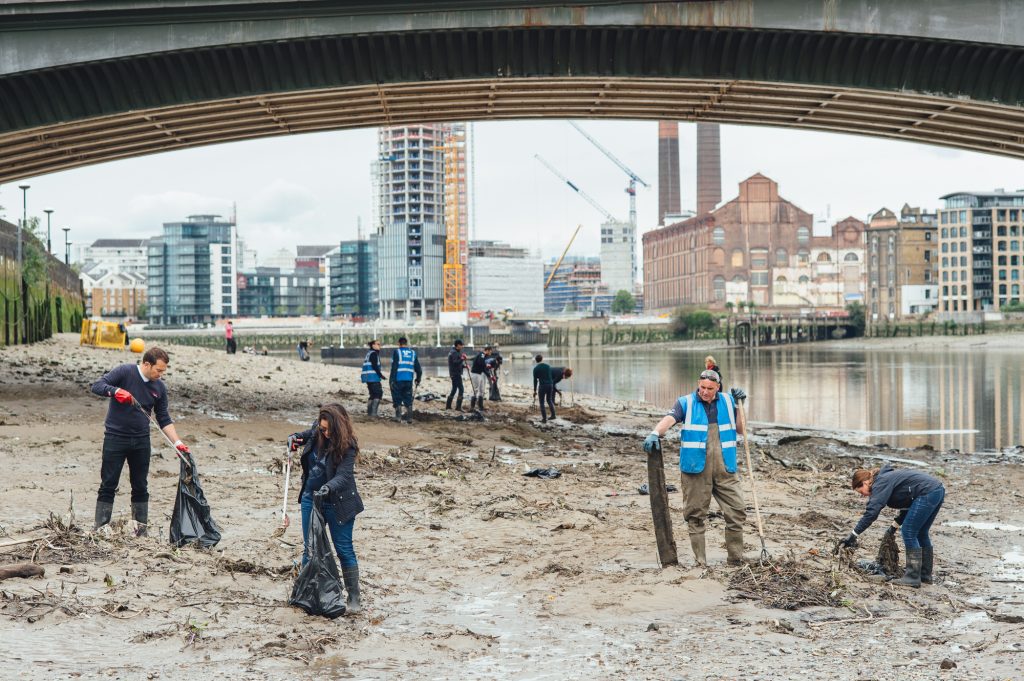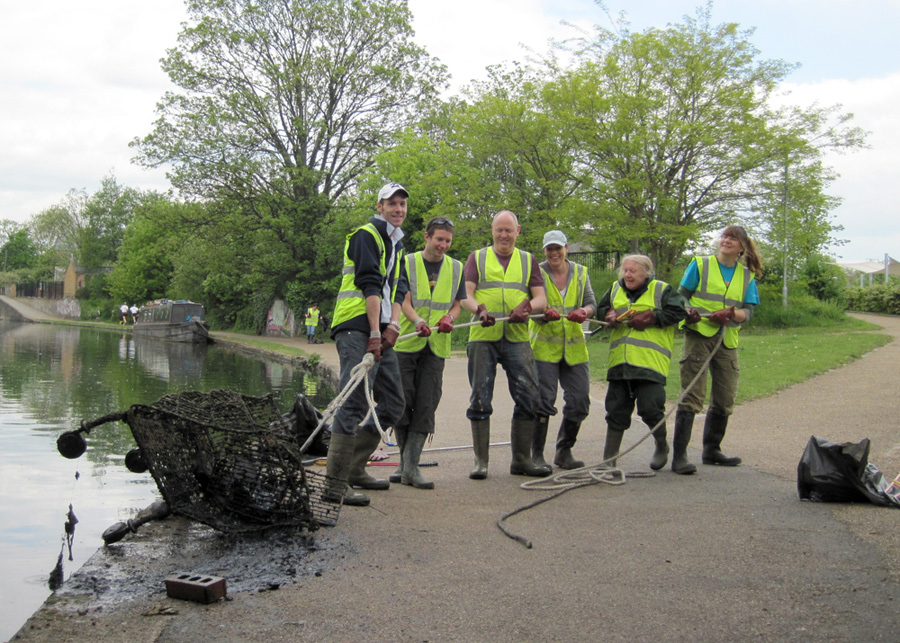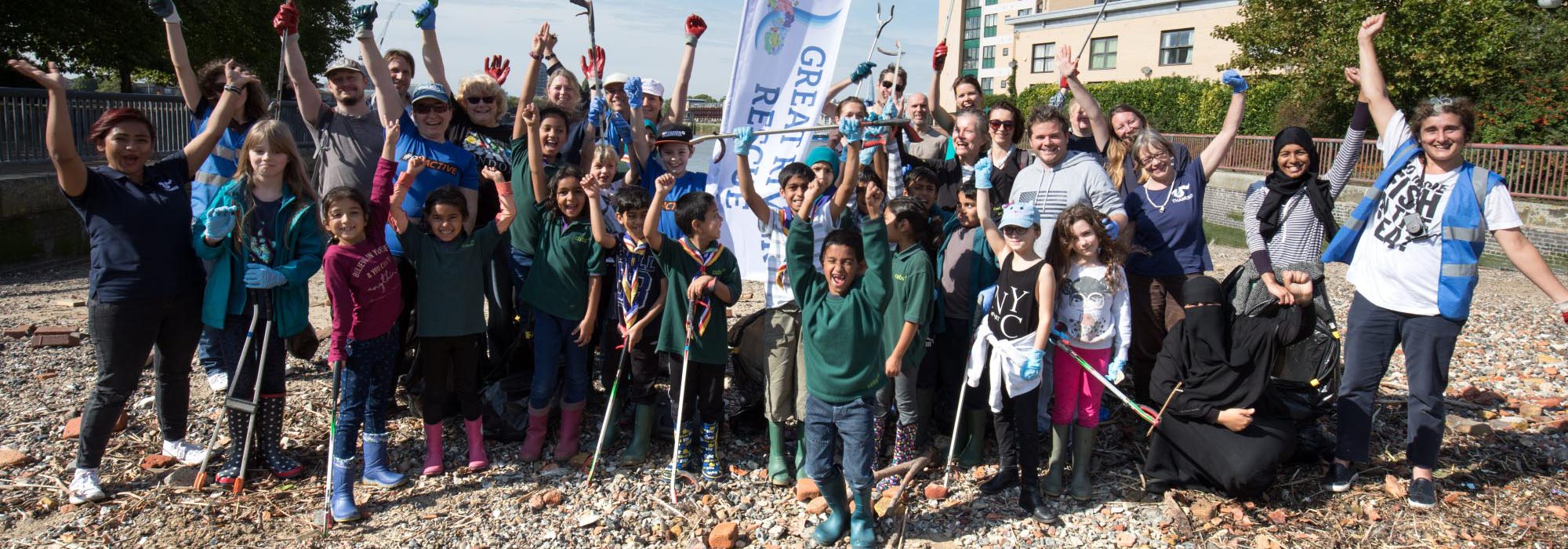The Great River Rescue is coming – and you’re invited!
Register to clean up your local river in October’s country-wide clean-up of our rivers
Date of release: August 30, 2017

The public is invited to help rescue the nation’s waterways during the month of October, by taking part in England’s first national clean-up focused on rivers. Plastic litter is a major issue blighting the nation’s waterways and the Great River Rescue, launched by a group of environmental organisations, invites the public to take direct action themselves.
Groups are invited to register their river clean-up events on the campaign webpage in September to raise awareness of the events to take place during October.
The campaign has been organised by environmental charity Thames21, the Marine Conservation Society, the Angling Trust and the Canal and River Trust.
It is inspired by Future Dust, a large-scale artwork by Maria Arceo in the shape of a giant plastic footprint commissioned and as part of Totally Thames, the September-long annual celebration of the River Thames. The installation will tour to different riverside locations across London and will be illuminated at dusk by Dutch interactive light artist Tim Scheffer.
Maria has spent a year collecting plastic litter from more than 40 beaches along the tidal Thames with the help of Thames21 and many committed volunteers. During the year, she became a Thames21 Badged Group leader by completing the charity’s Leading a Waterway Clean Up course, enabling her to lead clean-ups with volunteers. Special clean-ups were arranged to make sure plastic removed by Thames21 volunteers was incorporated into the sculpture.
Maria Arceo said: “I really recommend going on a clean-up. Not only does it feel very satisfying to remove the plastic items that cause so much damage, it’s fascinating to see what’s washed up and it’s usually great fun being beside the river, in good company. Because of Thames21’s long experience running clean-ups, I found their training and support invaluable.
“I was blown away when I realised that the people cleaning our rivers were actually kind volunteers that gave away freely their spare time. They are dealing with what is, at first look, a seemingly simple aesthetic problem that has, in actual fact, proven to be one of the biggest environmental and health related catastrophes that would define and reflect this short period in our confined human history, known as the Anthropocene. With my one-year-long art project ‘Thames Plastic & the exploration of future dust’ I wanted to give people a chance to experience first-hand, and to visually quantify, the serious amounts and types of everyday disposable plastics that, due to careless disposal, end up in the Thames – and eventually in our oceans and the planet’s food chain.”
 Debbie Leach, Chief Executive of Thames21, said: “Maria Arceo’s incredible artwork is an impelling and timely insight into the devastating quantity of plastic invading our waterways, and its impact on the planet. Now, we’re urging the public to organise their own clean-ups across England, or take part in one organised by the campaign partners.
Debbie Leach, Chief Executive of Thames21, said: “Maria Arceo’s incredible artwork is an impelling and timely insight into the devastating quantity of plastic invading our waterways, and its impact on the planet. Now, we’re urging the public to organise their own clean-ups across England, or take part in one organised by the campaign partners.
“Thousands of pieces of rubbish find their way into our streams, rivers, canals and oceans every year. Much of that litter is plastic. It causes untold damage to wildlife, stops us enjoying our rivers and open spaces and can potentially threaten our own health by getting into the food chain.
“We call on community organisations from sports teams to arts groups as well as individuals, youth groups, councils and housing associations up and down the country to get down to their local stretch of river in October and register their clean-up as part of the Great River Rescue.
“For many years, Thames21 has run nationally-accredited training courses on how to lead a waterway clean-up. But for the first time, we can help groups who aren’t close enough to a course by publishing a guide which gives you the basics on how to put on a clean-up event.”
Mark Lloyd, Chief Executive of the Angling Trust and Fish Legal, said: “The Angling Trust is delighted to be part of this campaign to tackle this growing problem head on with action and education. Anglers see at first hand the blight of litter in our rivers and on our beaches and witness the impact on aquatic wildlife. Many angling clubs already organise river litter clean-ups as part of our Take 5 initiative and we will be encouraging the millions of anglers nationally to get involved in this excellent campaign by Thames21.”
Justine Millard, Head of Volunteer Engagement at the Marine Conservation Society, said: “We’re thrilled to be supporting the Great River Rescue. Over the last two decades we have found increasing amounts of plastic litter on our beaches and we know some of that will have got their via our rivers. Any initiative that will remove unsightly plastic from our rivers will have a knock on effect for our beaches and that can only be a positive thing for both the UK’s inland and coastal waters. We would encourage as many people as possible to sign up to the Rescue and then get involved in our own river clean events taking place until June next year which have been sponsored by Waitrose.”
Jon Guest, Waterways Manager at the Canal & River Trust, said: “Rubbish being thrown into our canals and rivers is a problem that is not going away. The Great River Rescue is a great way to highlight the issues caused by discarded plastic and litter. We should be protecting these special places not damaging them. Our excellent army of volunteers help us to clear rubbish and we will be encouraging more people to join them as part of this campaign.”
Arlin Rickard, Chief Executive of The Rivers Trust, the umbrella body of the rivers trust movement commented: “This is a brilliant initiative and I urge everyone to get behind the Great River Rescue and do what they can to help. Organising or taking part in a clean up event really focuses the mind on the problem of littering and waste. We are all increasingly aware of the damage caused to the environment from micro plastics entering the food chain. Sadly the problem of littering affects both urban and rural waterways, with many rivers littered with agricultural plastic films and flotsam from road run off.”
A launch event for the campaign is being planned on World Rivers Day, Sunday September 24.
Read about the campaign at www.thames21.org.uk/GreatRiverRescue where a guide to putting on an event is available and the public can register an event.
- A photocall for Future Dust takes place on Thursday August 31 at 6pm at Potters Fields Park, London SE1 2AA. If you would be interested in sending a photographer, please contact Katy Eynon at Chloé Nelkin Consulting on katy@chloenelkinconsulting.com.
Media Contacts
Ian Lamont
Communications Manager at Thames21
07739 627667
020 7248 7171
Kirsten Downer
Communications Officer at Thames21
Kirsten.Downer@thames21.org.uk
07711 701 696
020 7248 7171
Notes to editors
Future Dust is a Totally Thames 2017 commission supported by King’s College London’s Departments of Chemistry and Geography, Cultural Institute at King’s, Arts Council England, Embassy of the Kingdom of the Netherlands, Hubbub and British Land. Transport and logistics has been supported by White’s Transport Ltd and the project offers special thanks to Thames21, Metal Culture and all the volunteers who have helped collect and sort the plastics. The installation will tour different riverside locations (see complete list below) across London and will be illuminated at dusk by Dutch interactive light artist Tim Scheffer.
The World Economic Forum predicts that, if mankind continues to let plastic pollute our waterways and does not change, the plastic in the sea will weigh more than the fish by 2050.
Future Dust will be on display at the following times and locations along the River Thames, London, in September.
- Friday 1 Sep, 11am – 11pm Potters Fields Park, SE1 2AA
- Sunday 3 – Wednesday 6 Sep, 11am – 11pm Oxo Tower Courtyard, Bargehouse Street, SE1 9PH
- Friday 8 – Wednesday 13 Sep, 11am – 11pm St. Katharine Docks, St. Katharine Marina, 50 St. Katharine’s Way, E1W 1LA
- Friday 15 – Wednesday 20 Sep, 11am – 11pm Watermans, 40 High St, Brentford, TW8 0DS
- Friday 22 – Saturday 30 Sep, 11am – 11pm Canary Wharf, adjacent to Canary Wharf Pier, E14 8RR
Facts on plastic in our rivers
The Port of London Authority’s Driftwood Team, with Thames21, remove 200 tonnes of debris from the tidal Thames alone each year
Packaging represents 75% of the litter washed up on the Thames foreshore. Food related packaging is 65%, with food wrappers alone 20% – the top single type of item
It is estimated 6.4 million tonnes of litter enters the sea annually, according to the National Academy of Sciences in the USA
An estimated 80% of all marine debris found in the ocean island based and 80-90% is made from plastic, according to the Last Plastic Straw campaign
Long-term change
If you are interested in the problems caused by plastic pollution in our waterways, there are various ways you can make a commitment to long-term change
Sign up to Thames21’s Leading a Waterway Clean Up
Get involved with The Marine Conservation Society’s annual Great British Beach Clean, the Angling Trust’s Just Take 5 Campaign, Keep Britain Tidy’s Riverine campaign, the Canal and River Trust’s What Lurks Beneath, or any Thames21 events throughout the year. Other initiatives to join up with are the Cleaner Thames Campaign, the Zoological Society of London’s #OneLess campaign and Sky’s Ocean Rescue campaign.
